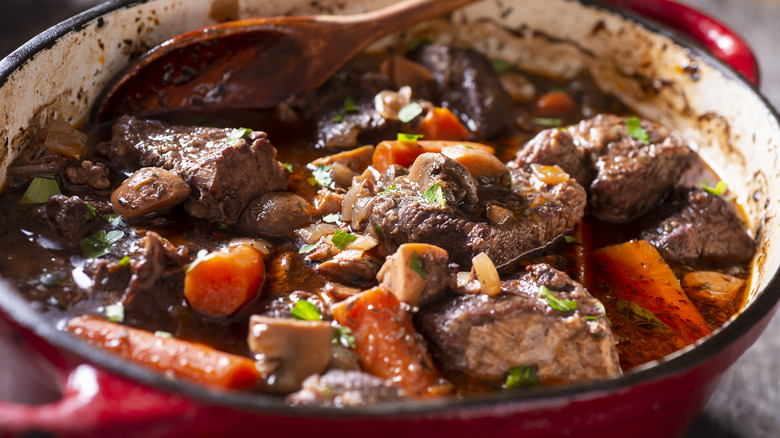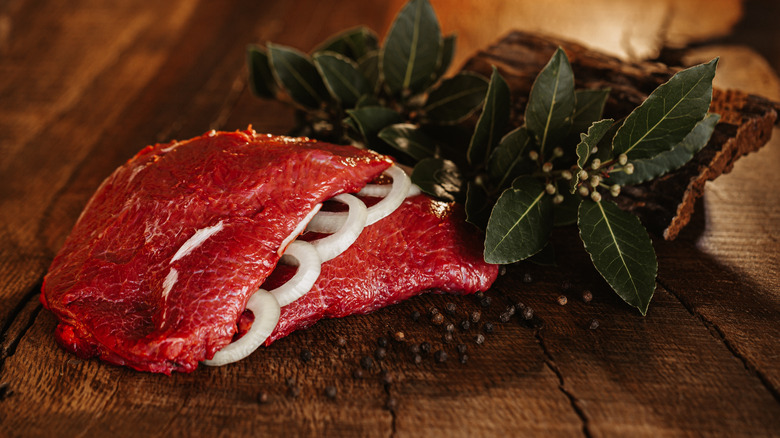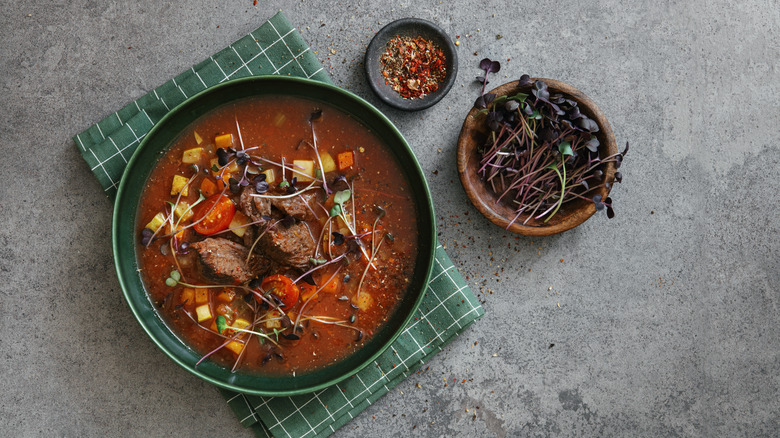The Underrated Cut Of Meat You Need To Throw In The Slow Cooker
There have been a number of culinary innovations over the past century, and the one that many of us just can't live without is the slow cooker. The first slow cooker was only granted patent approval relatively recently (in the grand scheme of things, at least) in 1940, and today, it's an invaluable asset that allows you to cook something low and slow, even if you don't have time to sit and watch a pot for hours. Now, let's say you're planning on making some easy slow cooker beef stew in the coming days, and maybe you're even planning on making a unique twist on this old idea with something like a beef stew with prunes and apples. You'll probably pick up stew meat, right?
Stew meat doesn't necessarily come from the same cut of beef all the time, it's just the name that's given to cubed meat that's from tougher cuts that need some serious cooking time to get tender. That's definitely a great option, but there's another vastly underrated cut of beef that a slow cooker can work magic with: Beef cheeks.
While there are plenty of foods with wildly misleading names — like figgy pudding, which doesn't contain figs and isn't even a pudding — beef cheeks actually are the cheeks of the cow. While that might have something to do with the reason many people might think twice before buying this particular cut, it definitely shouldn't deter you from using it in your slow-cooked dishes, and here's why.
Beef cheeks are delicious, tender, and flavorful
Different cuts of meat are known for being tough or naturally tender, and that's down to how much those muscles get worked while the cow is alive. It makes sense that meat that comes from the hips and shoulders is tough, but cheeks? Absolutely: As ruminants, cows graze then regurgitate grass to spend a lot of time chewing it with a side-to-side method that works the tongue and cheeks. As a result, these facial muscles are incredibly tough.
They're also extremely flavorful, often likened to having the same rich, beefy flavor as short ribs and brisket, thanks in part to the fat and collagen content that — when it's cooked properly — melts into the meat to add flavor even as it becomes more tender. Interestingly, beef cheeks were once a staple across rural farming communities, and it's no wonder they're seeing a resurgence with modern moves back to using all parts of an animal. There's a fun footnote to this, too: Beef cheeks are actually higher in protein than some other cuts of beef.
When it comes to texture, you can expect something along the lines of pulled pork. After being cooked to tenderness, beef cheeks will fall apart into shreds that means they're perfect for all kinds of slow-cooked meals.
Beef cheeks are surprisingly versatile
Beef cheeks are brilliant in a slow cooker beef and mushroom stew, and will fall apart into eat-to-eat shreds when properly prepared. Just how long that takes is going to depend on the recipe, of course, but it all starts at the store: When you pick them up from the butcher, ask for them to be skinned if they're not already, and good butchers will also cut away much of the fat. Then, when you get home, break out that slow cooker.
Some delicious beef cheek recipes are incredibly easy, and preparing them can be as simple as slow cooking them in a mirepoix and red wine, then serving them over rice, mashed potatoes, or noodles. Similarly, they work wonderfully in your favorite slow cooker beef stroganoff recipe, or in a hearty, vegetable-filled beef and Guinness stew.
Stews are just the start, though, and those slow-cooked beef cheeks can also make some seriously delicious tacos, especially when paired with the creaminess of avocado. Use them in some of your favorite winter slow-cooker soups — like a beef noodle soup, beef taco, or minestrone — and they can also add a delicious depth to many pasta recipes and they'll also seriously upgrade your slider game. The bottom line is that beef cheeks are a seriously underrated cut of meat that you'll be able to fully appreciate with the help of your slow cooker.


